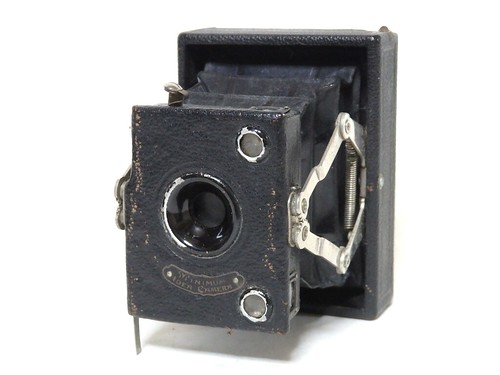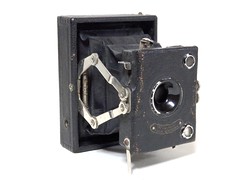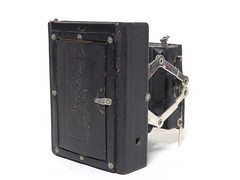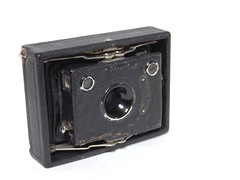Minimum Idea

|
| 1911 Rokuoh Sha Minimum Idea image by yalluflex (Image rights) |
The Minimum Idea (ミニマムアイデア) is a Japanese strut-folding camera taking 5.5×8cm meishi plates (more precisely 55×82mm). It was made by Rokuoh-sha, manufacturing branch of Konishi (the predecessor of Konica), from about 1911.[1]
Description
The Minimum Idea has a wooden body with an almost rectangular front standard mounted on spring-loaded folding struts inspired from some models of the Folding Pocket Kodak. This front standard contains two brilliant finders, for horizontal and vertical pictures, a simple shutter giving Time and Instant settings, and a simple meniscus lens.[2] The name MINIMUM IDEA CAMERA is inscribed on a small nameplate below the lens.
Commercial life
The Minimum Idea was reportedly released in April 1911.[3] It is listed as a new model (最新型) in the December 1911 catalogue of Konishi Honten, where it is called the "Idea" Minimum Camera (ミニマム、アイデヤ、カメラ).[4] The exposure format is given in older units as 1 sun 8 bu (一寸八分) width and 2 sun 7 bu (二寸七分) height; this translates as 5.5×8.2cm, commonly rounded as 5.5×8cm, and corresponds to the meishi (名刺) format. The dimensions of the camera are given as 9.7×7.3×2.7cm, and its weight as 225g.[5] The camera was supplied with six single-sided plate holders; set A (A號) included a cloth wallet and cost ¥9.50; set B (B號) included a leather case and cost ¥10.50.[6] Various accessories were also offered for the Minimum Idea, including a tripod and various darkroom accessories to process meishi plates.[7]
It is said that the Minimum Idea was a sales success, at least in relation to the state of the Japanese market at the time.[8] In March 1913, Konishi Honten organized photography awards for pictures taken by the Minimum Idea; the selected photographs were displayed at the fourth exhibition of the Tokyo Photographic Research Society (東京写真研究会).[9] A specific photographic club for the owners of the camera, called the Minimum Photographic Society (ミニマム写真会, Minimamu Shashin Kai), was founded on September 20, 1913.[10] It was perhaps the first time that such clubs appeared in Japan around a specific camera;[11] this would later become a common practice, notably around the Vest Pocket Kodak and Pearlette. The Minimum Idea was succeeded by the Korok, and it announced the wide success of the Pearlette.
Variations
In the original drawings known so far, the camera has a small leg retracting on the right side of the front standard, allowing it to stand on a table, and has no leather handle.[12] On the surviving examples, minor variations are visible in the shape of the standing leg and of the lock for the plate holders.[13] At least one surviving example has no standing leg at all and has an additional leather handle on the top.[14] It probably corresponds to a later evolution of the camera.
  
|
| 1911 Rokuoh Sha Minimum Idea 5.5x8cm Images by yalluflex. (Image rights) |
Notes
- ↑ Date: Kikuoka, p.28 of Kurashikku Kamera Senka no.10, Sugiyama, item 1085, Lewis, p.21.
- ↑ Time and Instant, meniscus lens: Kikuoka, p.28 of Kurashikku Kamera Senka no.10, Sugiyama, item 1085.
- ↑ Kikuoka, p.28 of Kurashikku Kamera Senka no.10, and chronology from the official company history Shashin to tomo ni hyaku-nen, reproduced in Tanaka, p.94 of Kurashikku Kamera Senka no.10.
- ↑ December 1911 catalogue of Konishi Honten, p.7.
- ↑ This is given in old units: 3 sun 2 bu length, 2 sun 4 bu width, 9 bu depth, 60 monme weight.
- ↑ The cloth wallet and leather case are also visible in the advertisement reproduced in this page of the R. Konishi Rokuoh-sha website.
- ↑ December 1911 catalogue of Konishi Honten, p.37.
- ↑ Kikuoka, p.28 of Kurashikku Kamera Senka no.10, Sugiyama, item 1085, Lewis, p.21.
- ↑ Tamura, p.41 of Kokusan kamera no rekishi.
- ↑ Tamura, p.41 of Kokusan kamera no rekishi, (with the precise date), and Sakai, p.10 of Kurashikku Kamera Senka no.10. Sugiyama, item 1085, says that various clubs appeared. Lewis, p.26, speaks of the "Minimum Idea Study Society".
- ↑ This is stated in Sakai, p.10 of Kurashikku Kamera Senka no.10.
- ↑ December 1911 catalogue of Konishi Honten, p.7, and drawings in this page of the R. Konishi Rokuoh-sha website.
- ↑ Examples pictured in Sugiyama, item 1085, in Lewis, pp.20–1, in Kamera no ayumi, p.67 (same picture in Sakai, p.10 of Kurashikku Kamera Senka no.10), in this page of the Center of the History of Japanese Industrial Technology and in this page and this page of Neco's camera collection.
- ↑ Example pictured in Kikuoka, p.28 of Kurashikku Kamera Senka no.10.
Bibliography
- Baird, John R. The Japanese Camera. Yakima, WA: Historical Camera Publications, 1990. ISBN 1-879561-02-6. P.26 (picture only).
- Kamera no ayumi. Zen nihon shashin renmei sōritsu 50-shūnen kinen (カメラのあゆみ・全日本写真連盟創立五〇周年記念, History of cameras, commemorating the 50th anniversary of the All Japan Association of Photographic Societies). Tokyo: Asahi Shinbunsha, 1976. No ISBN number. P.67.
- Kikuoka Sei (菊岡清). "Konica history 3. Meiji 41-nen – Taishō 12-nen." (Konica history 3. 明治41年–大正12年. From Meiji year 41 (1908) to Taishō year 12 (1923).) Kamera Rebyū: Kurashikku Kamera Senka (カメラレビュー クラシックカメラ専科) / Camera Review: All about Historical Cameras no.10, September 1987. No ISBN number. Konishiroku kamera no rekishi (小西六カメラの歴史, special issue on Konishiroku). Pp.24–32.
- Konishi Honten. Saishin Shashin Kikai Mokuroku (最新写真器械目録, Latest catalogue of photographic apparatus). Published on December 18, 1911. Recent reprint. Pp.7 and 37.
- Lewis, Gordon, ed. The History of the Japanese Camera. Rochester, N.Y.: George Eastman House, International Museum of Photography & Film, 1991. ISBN 0-935398-17-1 (paper), 0-935398-16-3 (hard). Pp.20–1 and 26–7.
- McKeown, James M. and Joan C. McKeown's Price Guide to Antique and Classic Cameras, 12th Edition, 2005-2006. USA, Centennial Photo Service, 2004. ISBN 0-931838-40-1 (hardcover). ISBN 0-931838-41-X (softcover). P.543.
- Sakai Shūichi (酒井修一). "'Anbako' kara 'ōtofōkasu' he: kamera no hensen to tomo ni ayunda 114-nen" (「暗函」から「オートフォーカス」へ・カメラの変遷と共に歩んだ114年, From 'camera obscura' to 'autofocus': 114 years of camera evolution). Kamera Rebyū: Kurashikku Kamera Senka (カメラレビュー クラシックカメラ専科) / Camera Review: All about Historical Cameras no.10, September 1987. No ISBN number. Konishiroku kamera no rekishi (小西六カメラの歴史, special issue on Konishiroku). Pp.8–13.
- Sugiyama, Kōichi (杉山浩一); Naoi, Hiroaki (直井浩明); Bullock, John R. The Collector's Guide to Japanese Cameras. 国産カメラ図鑑 (Kokusan kamera zukan). Tokyo: Asahi Sonorama, 1985. ISBN 4-257-03187-5. Item 1085. (See also the colour pictures at the beginning.)
- Tamura Hiroshi (田村寛). "Nichiro-sensō ato no shashin seihin to fukyū" (日露戦争後の写真製品と普及, Diffusion of photography and photographic products after the Russo-Japanese War). Shōwa 10–40nen kōkoku ni miru kokusan kamera no rekishi (昭和10〜40年広告にみる国産カメラの歴史, Japanese camera history as seen in advertisements, 1935–1965). Tokyo: Asahi Shinbunsha, 1994. ISBN 4-02-330312-7. Pp.40–3.
- Tanaka Yoshirō (田中芳郎). "Meiji–Taishō jidai no Konishi Honten no kamera wo shiru tame no hon" (明治・大正時代の小西本店のカメラを知るための本, Books about the Konishi Honten cameras of the Meiji and Taishō eras). Kamera Rebyū: Kurashikku Kamera Senka (カメラレビュー クラシックカメラ専科) / Camera Review: All about Historical Cameras no.10, September 1987. No ISBN number. Konishiroku kamera no rekishi (小西六カメラの歴史, special issue on Konishiroku). Pp.92–4.
Links
In Japanese:
- Minimum Idea in Neco's camera collection, with more pictures here
- Minimum Idea in the Camera database of the Center of the History of Japanese Industrial Technology
- Pages of the R. Konishi Rokuoh-sha website:
- Minimum Idea surviving example
- Minimum Idea, containing a reproduction of an advertisement and of the rules of the Minimum Shashinkai (ミニマム写真会, Minimum Photo Club).
- Drawing on the original cardboard box for the Minimum Idea accessories
- Minimum Idea in the camera list
| Konishiroku prewar and wartime cameras () | ||||||
|---|---|---|---|---|---|---|
| plate | hand cameras | stereo hand cameras | strut folders | box | telephoto | SLR |
| Idea (original) | Idea A | Idea B | Idea Snap | Idea No.1 | Idea (metal) | Lily (original) | Lily (horizontal) | Lily (metal) | Tropical Lily | Noble | Ohca | Sakura Palace | Sakura Pocket Prano | Sakura Prano | Idea Binocular | Sakura Binocular Prano | Minimum Idea | Idea Spring | Korok | Champion | Cherry | Sakura Army | Sakura Honor | Sakura Navy | Idea Telephoto | Idea Reflex (1910 and 1911) | Idea Reflex (1932) | Neat Reflex | Sakura Reflex Prano | |
| rollfilm | folders | box or collapsible | TLR | |||
| Pearlette | Special Pearlette | B Pearlette | Pearl (for plates and rollfilm) | Pearl No.2 | Pearl (Year 8) | Baby Pearl | Semi Pearl | Sakura Palace | Record | Sakura (box) | Sakura (bakelite) | Sakura-flex | ||||